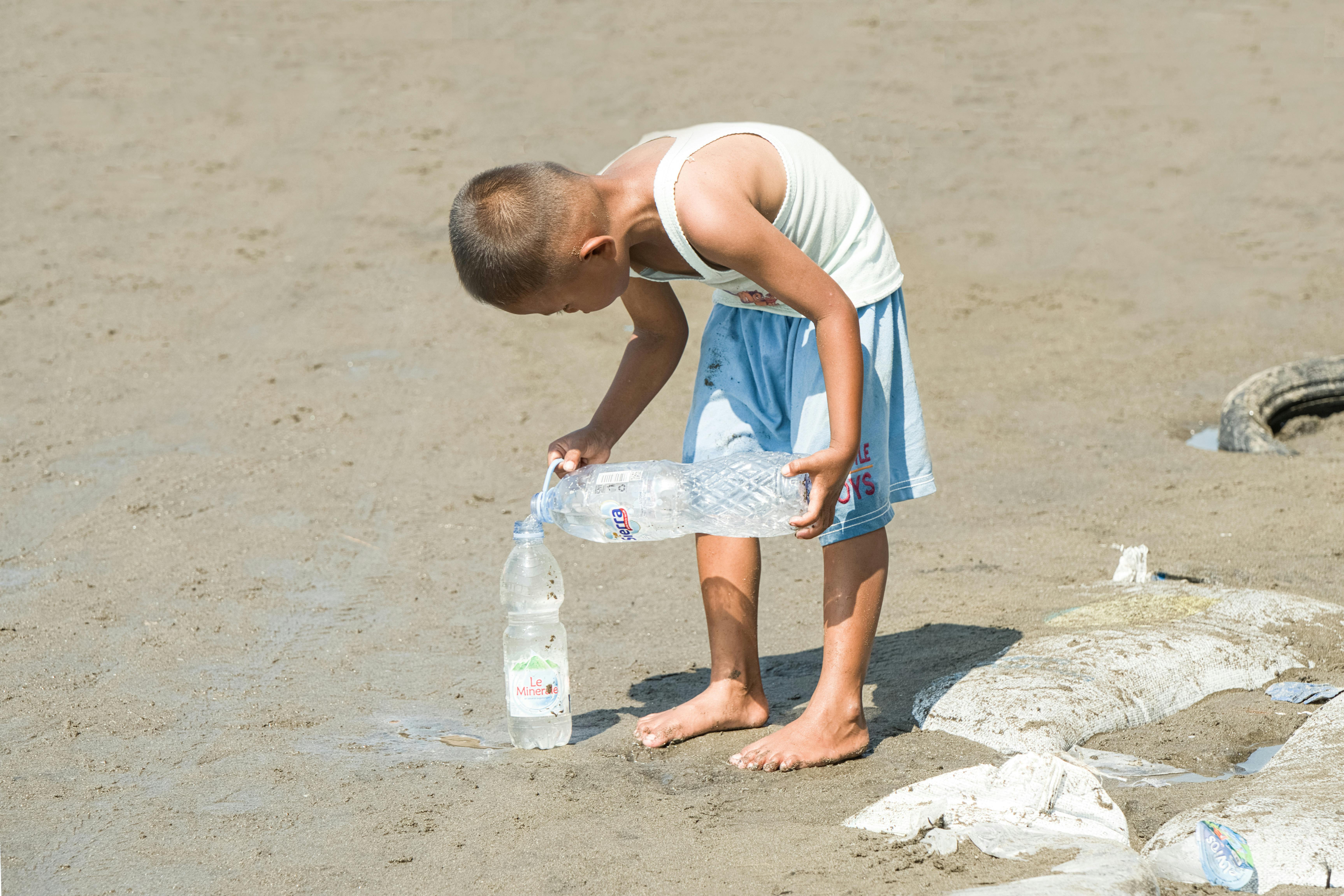Bottled Water
Bottled water is drinking water that has been packaged in a single-use plastic container. It is usually sold in bottles ranging from small individual sizes to larger containers. Bottled water is produced and sold for consumption both at home and away from home. It is a popular choice for those seeking an alternative to tap water or other beverages. Bottled water is regulated by the Food and Drug Administration (FDA) and must meet certain safety standards before it can be sold. In addition, many bottled water companies also adhere to additional industry standards.Bottled water can provide many benefits, including convenience, portability, and taste. It can also offer peace of mind for those concerned about the quality of their tap water or seeking an alternative for environmental reasons. Additionally, bottled water can help promote good hydration habits due to its ready availability in single-serving containers that make it easy to track daily intake.
However, there are some drawbacks associated with bottled water as well. These include the environmental impacts of the plastic packaging, as well as the cost versus tap water which is typically much less expensive. Additionally, there are concerns over the quality of some brands of bottled water which may be no better than tap water in terms of safety or purity standards.
Overall, bottled water can be a convenient way to stay hydrated on the go while providing peace of mind when it comes to quality control and safety standards. However, it is important to consider both the pros and cons of choosing bottled over tap when making your decision.
Differences Between Bottled and Distilled Water
Bottled water and distilled water are both popular choices for drinking water, but there are some notable differences between the two. Bottled water is sourced from natural springs or other natural sources, while distilled water is produced by boiling and condensing the steam produced. This process removes impurities from the water, making it much purer than bottled water.Bottled water can be purchased in a variety of sizes and types, including single-serve plastic bottles or large jugs. Distilled water is typically sold in gallon containers or larger. Although bottled water is convenient and easy to find, it may contain trace amounts of minerals, bacteria, and other contaminants that are not found in distilled water.Distilled water has a flat taste compared to bottled water due to its lack of minerals. It also has less of an odor than bottled water because it does not contain any organic material that can produce odors. Distilled water also has a longer shelf life since it does not contain any bacteria or other organisms that can cause spoilage. In terms of health benefits, many people choose to drink distilled over bottled because it is free of chemicals and other contaminants. However, some experts argue that the lack of minerals found in distilled water can be detrimental to one’s health over time if consumed regularly.The cost of buying bottled versus distilled varies depending on the brand and size purchased. Generally speaking, distilled is more expensive than bottled due to the distillation process required to make it. When choosing between bottled and distilled for drinking purposes, consider your budget as well as your personal preferences in terms of taste, odor, convenience, and health benefits.Benefits of Drinking Distilled Water
Drinking distilled water has many benefits for the body. It is a great way to cleanse the body and flush out toxins. It helps to remove impurities from the water, such as chlorine and other chemicals, that can make us sick. Distilled water is also free of minerals and salts, which makes it easier for our bodies to absorb and use. In addition, it is much lower in sodium than regular tap water, which can help reduce high blood pressure and other health issues associated with too much sodium intake.Another benefit of drinking distilled water is that it can improve digestion. Because it is free of contaminants and impurities, it can help to make digestion easier on the body. It can also help with general hydration since it does not contain any minerals or salts that could cause dehydration. Lastly, distilled water has been known to help improve the taste of food when used in cooking or baking.
Overall, drinking distilled water has many health benefits for both short-term and long-term consumption. Not only does it help to flush out toxins from our bodies, but it also helps with digestion and general hydration. By drinking distilled water regularly, we can ensure that our bodies are getting all the nutrients they need while avoiding any contamination from minerals or salts found in regular tap water.
Environmental Impact
The production of bottled water has a large environmental impact. The bottles themselves require massive amounts of petroleum to produce, and their disposal creates an enormous amount of waste that is difficult to recycle. Furthermore, the transportation of bottled water from the source to the store contributes significantly to greenhouse gas emissions.Cost
Bottled water can be quite costly compared to tap water and filtered tap water. The cost of purchasing bottles and the cost associated with transporting them makes bottled water much more expensive than other options. Additionally, many people purchase multiple cases at a time, which can add up quickly.Health Risks
Although bottled water is often perceived as being safer than tap water, this is not always the case. In some cases, it has been found that bottled water contains contaminants such as arsenic and lead that are not present in tap water. Furthermore, some brands of bottled water have been found to contain bacteria and other micro-organisms that can cause illness if consumed in large quantities.Taste
One potential drawback of drinking bottled water is that it may not taste as good as other types of drinking water. This is because many brands are simply filtered versions of tap water, which may lack certain minerals or have an unpleasant taste due to the presence of chlorine or other chemicals used in the filtering process.
Is Bottled Water Processed?
Bottled water is a type of beverage that is widely consumed by people around the world. It is often seen as a healthier alternative to other sugary drinks, and it may also provide some additional benefits compared to tap water. However, many people are curious about how bottled water is processed before it is packaged and sold.The process of bottling water typically begins with the source of the water. This can be a natural source such as a lake, river, or spring, or it may be from municipal sources such as tap water. The source of the water will determine what type of treatment is necessary in order to make it safe for consumption.Once the source has been determined, the water must then go through some form of purification before it can be bottled. This process usually involves filtration and/or reverse osmosis in order to remove any contaminants or impurities from the water. Depending on how contaminated the source water may be, additional treatments such as UV light or ozone may also be used in order to ensure that it meets certain safety standards.After all required treatments have been applied to the source water, it must then be tested for safety and quality assurance purposes before it can be deemed suitable for bottling. Once this testing has been completed, the bottled water can then move into its packaging phase.The packaging phase involves filling bottles with purified water and sealing them shut with caps or lids in order to prevent contamination once they have left the facility. In some cases, additional treatments such as pasteurization or carbonation may also be applied before bottling takes place in order to further improve taste and quality of the final product.Once everything has been completed and all safety standards have been met, bottled water can then move into being sold at retail outlets for consumers to purchase. All of these steps help ensure that each batch of bottled water has gone through a rigorous process in order to meet all safety requirements and provide a safe product for consumers to enjoy.Is Bottled Water Considered Distilled Water?
Is bottled water considered distilled water? This depends on the type of bottled water. Many brands source water from springs or municipal supplies. However, to clarify the distinction, understanding the definition of distilled water is essential, as it refers to water purified through boiling and condensation, removing impurities and minerals.
Is Bottled Water the Same as Distilled Water?
Bottled water and distilled water differ significantly in their treatment and composition. While distilled water undergoes a purification process to remove impurities, bottled water may contain minerals and additives. To understand the quality better, consumers often wonder, “what’s really in bottled distilled water” compared to traditional bottled options.
Is Distilled Water Safe to Drink if It’s Bottled?
Distilled water is a form of purified water that removes impurities and contaminants through the distillation process. When considering “distilled water versus bottled water explained clearly,” one finds that distilled water can be safe to drink, as long as it’s bottled properly and stored in a clean environment.
How is Distilled Water Made?
Distilled water is made through a process of distillation. This involves boiling the water and collecting the steam as it condenses back into liquid form, leaving behind any impurities or minerals present in the original water. The steam is then collected and cooled, turning back into liquid form as pure water. This process removes any potential contaminants and makes the water safe to drink.The distillation process can be done in several ways, depending on the desired outcome. For example, if a large volume of water needs to be distilled quickly, an industrial-grade distiller may be used. This machine will boil the water rapidly and collect the steam, which can then be cooled to create pure distilled water. For smaller scale operations, a simple pot still can be used to heat up the water and collect the steam for condensation.
No matter which method is used for distilling water, all of them involve boiling the water to separate out any unwanted particles or contaminants from it. Once it has been boiled and cooled, the resulting liquid should be free from most impurities and safe for drinking or other uses that require pure distilled water.
Does Bottled Water Contain Minerals or Nutrients?
Bottled water does contain minerals and nutrients, though the exact amount and type of minerals and nutrients vary depending on the source of the water. Bottled spring water typically contains calcium, magnesium, sodium, potassium, and other trace minerals. Depending on the source of the bottled water, it may also contain fluoride and other trace elements. Bottled mineral water is typically sourced from a natural mineral spring or other underground sources and contains a higher concentration of minerals than bottled spring water. Mineral water typically contains significant amounts of calcium, magnesium, sodium, potassium, bicarbonate, sulfate, chloride and fluoride. Additionally, some brands of mineral water may also contain trace amounts of iron or other trace elements.
Conclusion
Bottled water is often marketed as a healthier alternative to tap water, however, not all bottled water is distilled. While some brands do offer distilled bottled water, it is not a common practice. In most cases, the bottled water that people purchase is simply filtered tap water. While filtration can improve the taste and smell of the water, it does not remove all contaminants. Therefore, if you are looking for truly pure drinking water, you should consider purchasing distilled bottled water or investing in a home distillation system.Overall, there are many benefits to drinking distilled water. Distillation removes almost all impurities from the source material and provides a safe and healthy drinking option for people who want to avoid chemicals and toxins found in tap waters. However, it is important to note that not all bottled waters are distilled; therefore, be sure to read the labels before purchasing any type of bottled water.

